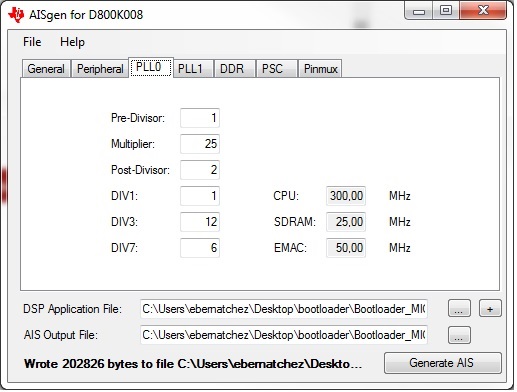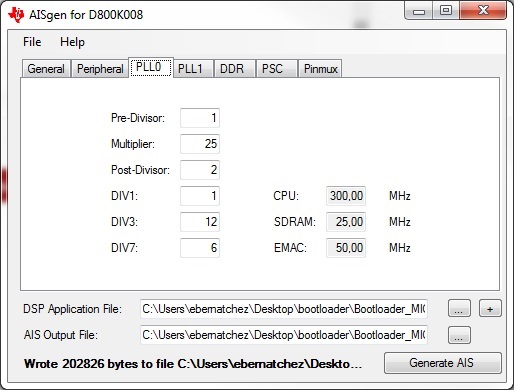Hi TI,
This discussion is related to the following posts :
https://e2e.ti.com/support/dsp/tms320c6000_high_performance_dsps/f/112/t/488407
https://e2e.ti.com/support/dsp/tms320c6000_high_performance_dsps/f/112/t/489602
I am trying to generate an AIS image (.h) from a .out using AISGen.The .Programis proven tobe functionnal I can run it in debug with a GEL file.
In AISGen I set the PLL0, PLL1, DDR, PSC and PINMUX options. The DSP does not seem to like any of the options. I basically configured all the options based on the GEL file I use to run my program from the JTAG emulator.
The AIS image I generated first starts by setting the PLL0 and clock. The DSP fails as soon as it receives the command 0x5853590D.
My AIS program starts with the following hex code :
0x41504954
0x5853590D
0x00030006 <- DSP fails after processing this line
0x00180001
0x00000B05
0x00000095
0x5853590D
0x00080003
I used a logic analyser on the SPI lines and the DSP stopps sending the 0x3 command.
I used the debug GEL file as you recommended (http://processors.wiki.ti.com/index.php/OMAP-L1x_Debug_Gel_Files
C674X_0: GEL Output: ---------------------------------------------
C674X_0: GEL Output: | BOOTROM Info |
C674X_0: GEL Output: ---------------------------------------------
C674X_0: GEL Output: ROM ID: d800k008
C674X_0: GEL Output: Silicon Revision 2.1
C674X_0: GEL Output: Boot pins: 10
C674X_0: GEL Output: Boot Mode: SPI0 Flash
C674X_0: GEL Output:
ROM Status Code: 0x00000010
Description:C674X_0: GEL Output: Invalid argument count
C674X_0: GEL Output:
Program Counter (PC) = 0x80000EC0
I dont understand what can be wrong that wrong with this command. The PLL0 parameters matches what I use in the GEL file and to me its seems to be valid parameters.
I looked at the image examples you refered in my previous post (http://processors.wiki.ti.com/index.php/Boot_Images_for_OMAP-L138
uses the optionnal configuration (PLL0, PLL1, DDR, PSC or PINMUX).
I tried deactivating all the options, the program transfers correctly but does not run at all... Is it possible the Silicon 2.1 has some issue interpreting the optionnal
commands?
Here are screen shots of the setting in AISgen :
please could you help understand why setting any of the optional tabs in AISGen fails with the silicon 2.1 while it works with our silicon 2.0 processor ?
thanks,
Eric



